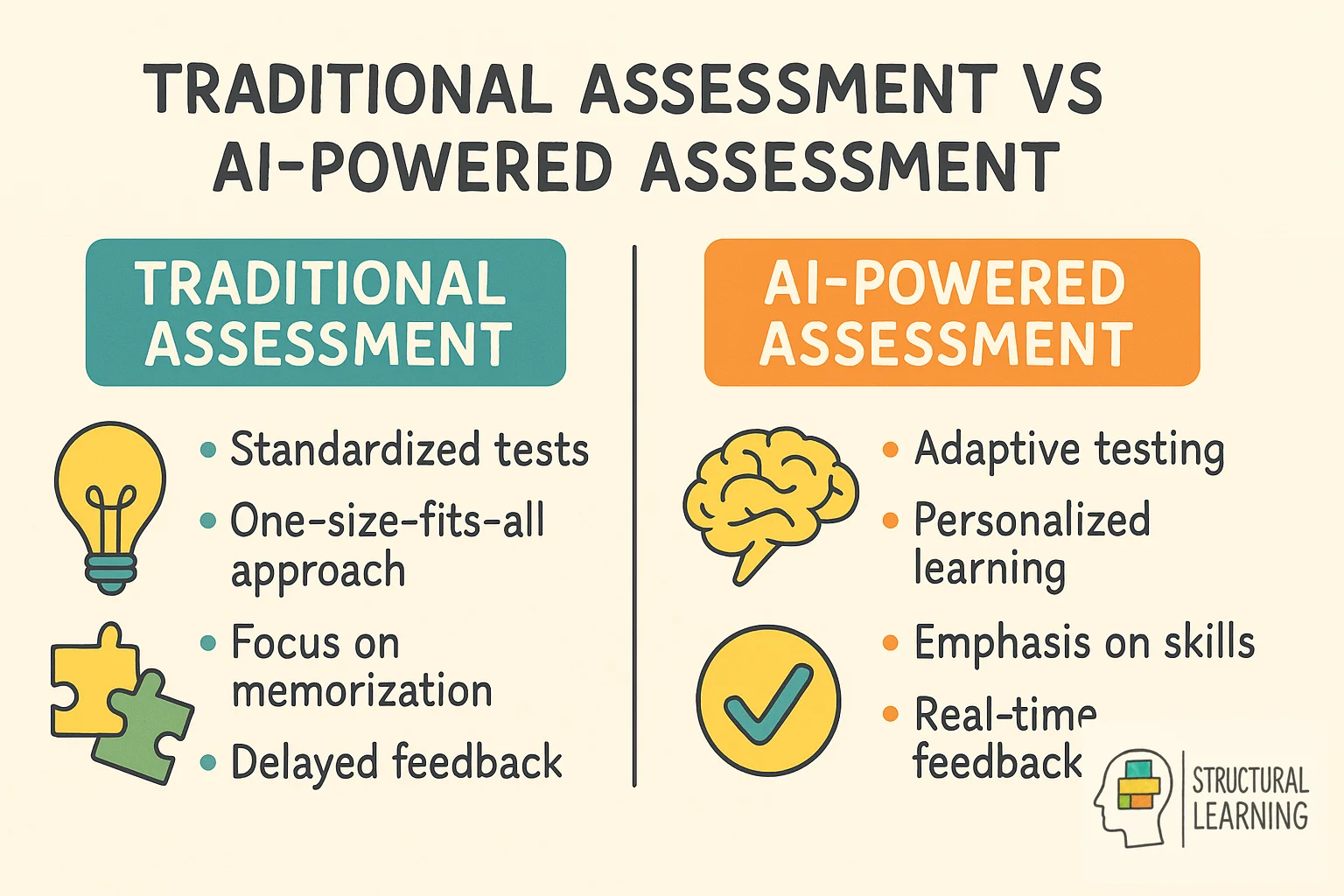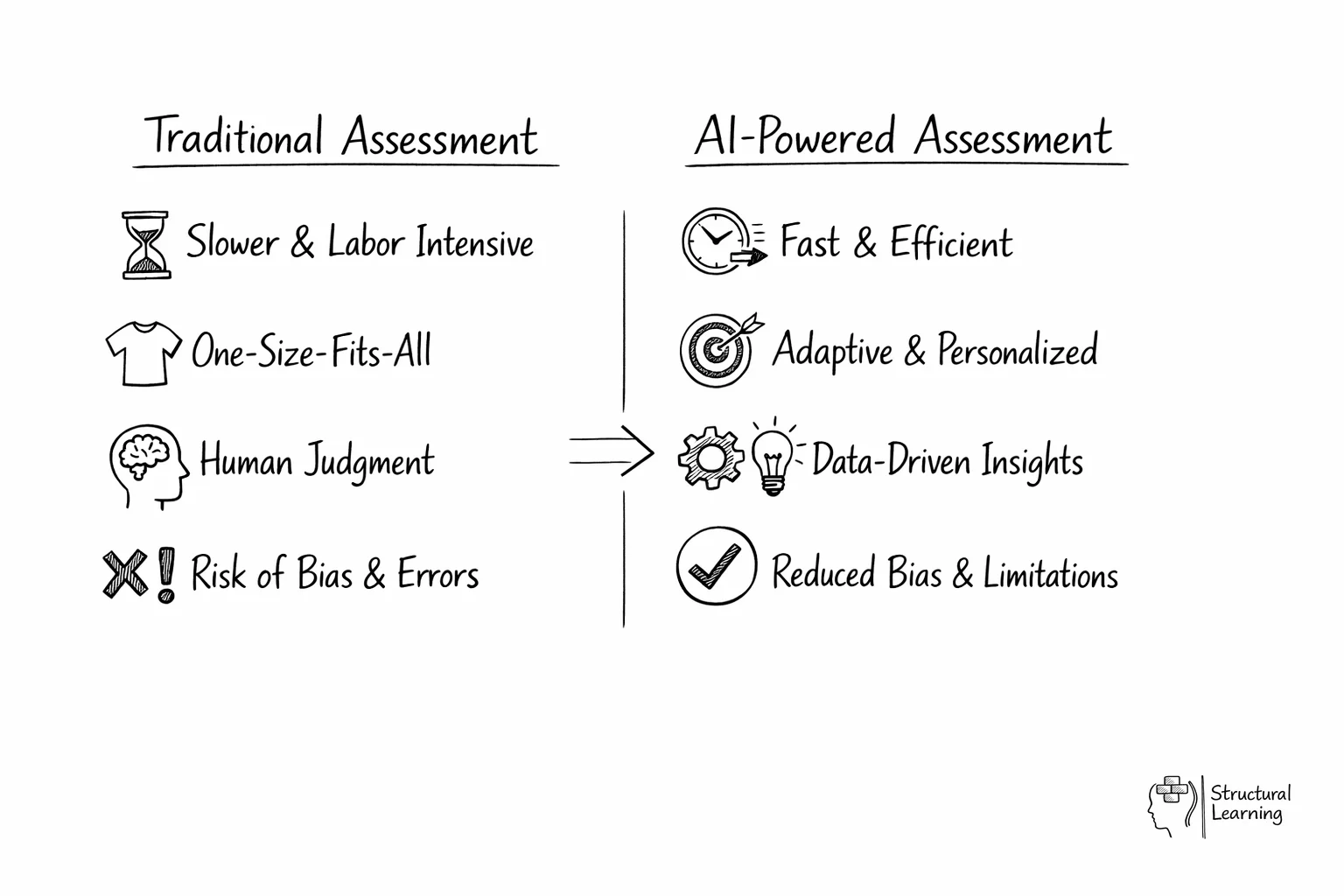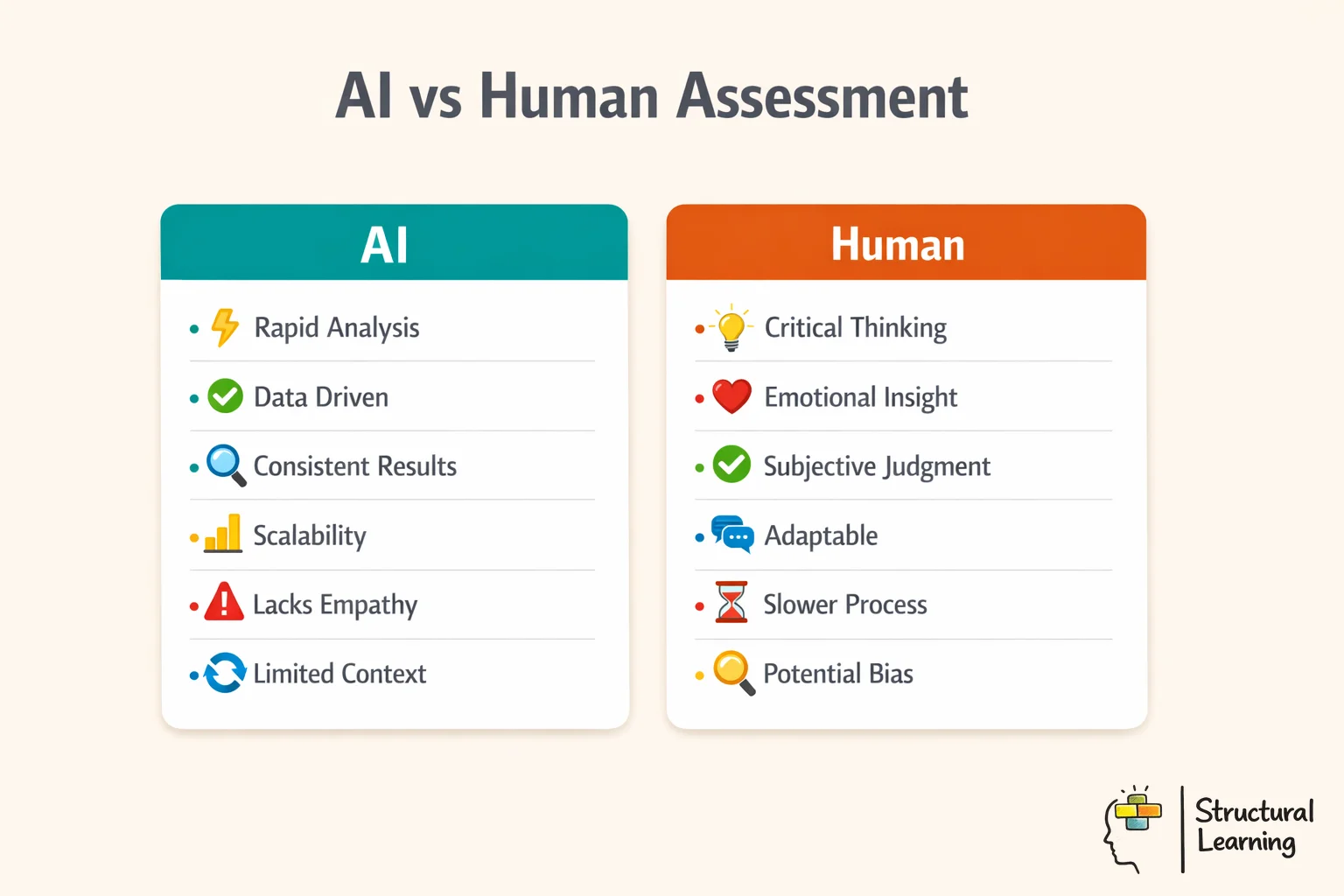AI and Student Assessment
Explore how AI in Education is transforming student assessment, from personalised learning to ethical challenges and innovative lesson planning.


Explore how AI in Education is transforming student assessment, from personalised learning to ethical challenges and innovative lesson planning.
In classrooms around the world, AI in Education is no longer a futuristic concept, it's an emerging reality reshaping how teachers and learners approach progress and performance. As schools explore AI for Teachers and AI for Learning, the familiar red pen is gradually giving way to digital tools that promise faster, more tailored assessment experiences.
Research from 2024-2025 highlights important limitations of AI-based grading:
AI and Student Assessment encompasses much more than automating grades or generating quizzes. At its best, it offers a dynamic framework for creating fair, diverse, and responsive evaluations that adapt to individual learning needs. From AI Lesson Planningthat builds assessments aligned to curriculum goals, to real-time monitoring systems that identify gaps and support intervention, the technology holds both enormous promise and important questions.


While many educators are intrigued by the possibilities, such as instant feedback and richer insights into student understanding, there is also a shared caution. Can AI fully replicate the nuanced judgment and relational awareness of a skilled teacher? What ethical safeguards are needed to ensure data privacy and prevent bias?
these questions, looking closely at the benefits of AI-powered assessment, potential risks, and strategies to integrate new tools responsibly. We'll share examples of schools using AI to personalise learning, consider practical approaches to implementation, and reflect on what all this means for the next generation of learners.
Key Points:
AI transforms modern student assessment by automating routine grading tasks while providing deeper insights into learning patterns and student thinking processes. It enables real-time feedback, personalized assessment experiences, and data-driven intervention strategies that help teachers identify learning gaps immediately. However, AI serves as a powerful tool that enhances rather than replaces human judgment in educational decision-making.
Artificial Intelligence (AI) is transforming modern education by streamlining the assessment process. With advanced algorithms, AI tools can automate scoring and provide efficient, personalized feedback. This not only saves time for educators but also enhances student engagement by providing tailored insights.

Moreover, AI-integrated assessments encourage students to use AI technologies responsibly. By critically evaluating these tools, students develop essential career skills. Schools are creatively incorporating AI in assessments to creates academic integrity. Authentic evaluation methods are crafted to minimise cheating, a critical aspect of educational assessment.
Globally, countries are drafting guidelines for AI's educational use. Australia's policies, for instance, aim to boost critical thinking and creativity among students.
Here's how AI impacts assessments:
In South Korea, formative assessments use AI to analyse work and recommend study steps. Such personalized approaches align with Bloom's taxonomy, aiding higher-order thinking skills and conceptual understanding. As AI in the classroom grows, its role is pivotal, underlining AI's potential to reshape learning outcomes.
Internationalperspectives on global education, and schools are adapting to integrate AI responsibly, developing students' skills and knowledge in a rapidly evolving world.
Integrating AI tools in student assessment effectively requires careful planning, ethical considerations, and a focus on enhancing rather than replacing human judgment. Here are actionable steps for educators:
By following these steps, schools can harness the power of AI to create more efficient, personalised, and fair assessment experiences that support student success.
One of the primary concerns with AI in grading is the potential for bias. AI algorithms are trained on data, and if that data reflects existing societal biases, the AI will perpetuate and even amplify those biases in its assessments. Here's how to address this:
By actively addressing the potential for bias, educators can ensure that AI assessment tools are used fairly and equitably.
As AI becomes more integrated into education, its role in student assessment will continue to evolve. By thoughtfully integrating AI, educators can create assessment methods that are not only efficient but also deeply supportive of individual student growth. Embracing AI in education requires a commitment to ongoing learning, ethical responsibility, and a dedication to developing a learning environment where every student has the opportunity to thrive.
The journey of integrating AI into student assessment is ongoing, marked by continuous exploration, adaptation, and reflection. As educators, policymakers, and technologists collaborate, they shape the future of assessment in ways that are both effective and equitable. By embracing AI's potential while remaining vigilant about its limitations, the education community can ensure that assessment serves as a powerful tool for enhancing learning and helping students for success in the 21st century.
Artificial intelligence teaching
In classrooms around the world, AI in Education is no longer a futuristic concept, it's an emerging reality reshaping how teachers and learners approach progress and performance. As schools explore AI for Teachers and AI for Learning, the familiar red pen is gradually giving way to digital tools that promise faster, more tailored assessment experiences.
Research from 2024-2025 highlights important limitations of AI-based grading:
AI and Student Assessment encompasses much more than automating grades or generating quizzes. At its best, it offers a dynamic framework for creating fair, diverse, and responsive evaluations that adapt to individual learning needs. From AI Lesson Planningthat builds assessments aligned to curriculum goals, to real-time monitoring systems that identify gaps and support intervention, the technology holds both enormous promise and important questions.


While many educators are intrigued by the possibilities, such as instant feedback and richer insights into student understanding, there is also a shared caution. Can AI fully replicate the nuanced judgment and relational awareness of a skilled teacher? What ethical safeguards are needed to ensure data privacy and prevent bias?
these questions, looking closely at the benefits of AI-powered assessment, potential risks, and strategies to integrate new tools responsibly. We'll share examples of schools using AI to personalise learning, consider practical approaches to implementation, and reflect on what all this means for the next generation of learners.
Key Points:
AI transforms modern student assessment by automating routine grading tasks while providing deeper insights into learning patterns and student thinking processes. It enables real-time feedback, personalized assessment experiences, and data-driven intervention strategies that help teachers identify learning gaps immediately. However, AI serves as a powerful tool that enhances rather than replaces human judgment in educational decision-making.
Artificial Intelligence (AI) is transforming modern education by streamlining the assessment process. With advanced algorithms, AI tools can automate scoring and provide efficient, personalized feedback. This not only saves time for educators but also enhances student engagement by providing tailored insights.

Moreover, AI-integrated assessments encourage students to use AI technologies responsibly. By critically evaluating these tools, students develop essential career skills. Schools are creatively incorporating AI in assessments to creates academic integrity. Authentic evaluation methods are crafted to minimise cheating, a critical aspect of educational assessment.
Globally, countries are drafting guidelines for AI's educational use. Australia's policies, for instance, aim to boost critical thinking and creativity among students.
Here's how AI impacts assessments:
In South Korea, formative assessments use AI to analyse work and recommend study steps. Such personalized approaches align with Bloom's taxonomy, aiding higher-order thinking skills and conceptual understanding. As AI in the classroom grows, its role is pivotal, underlining AI's potential to reshape learning outcomes.
Internationalperspectives on global education, and schools are adapting to integrate AI responsibly, developing students' skills and knowledge in a rapidly evolving world.
Integrating AI tools in student assessment effectively requires careful planning, ethical considerations, and a focus on enhancing rather than replacing human judgment. Here are actionable steps for educators:
By following these steps, schools can harness the power of AI to create more efficient, personalised, and fair assessment experiences that support student success.
One of the primary concerns with AI in grading is the potential for bias. AI algorithms are trained on data, and if that data reflects existing societal biases, the AI will perpetuate and even amplify those biases in its assessments. Here's how to address this:
By actively addressing the potential for bias, educators can ensure that AI assessment tools are used fairly and equitably.
As AI becomes more integrated into education, its role in student assessment will continue to evolve. By thoughtfully integrating AI, educators can create assessment methods that are not only efficient but also deeply supportive of individual student growth. Embracing AI in education requires a commitment to ongoing learning, ethical responsibility, and a dedication to developing a learning environment where every student has the opportunity to thrive.
The journey of integrating AI into student assessment is ongoing, marked by continuous exploration, adaptation, and reflection. As educators, policymakers, and technologists collaborate, they shape the future of assessment in ways that are both effective and equitable. By embracing AI's potential while remaining vigilant about its limitations, the education community can ensure that assessment serves as a powerful tool for enhancing learning and helping students for success in the 21st century.
Artificial intelligence teaching
{"@context":"https://schema.org","@graph":[{"@type":"Article","@id":"https://www.structural-learning.com/post/ai-and-student-assessment#article","headline":"AI and Student Assessment","description":"Explore how AI in Education is transforming student assessment, from personalised learning to ethical challenges and innovative lesson planning.","datePublished":"2025-07-01T14:39:55.198Z","dateModified":"2026-01-26T10:09:32.212Z","author":{"@type":"Person","name":"Paul Main","url":"https://www.structural-learning.com/team/paulmain","jobTitle":"Founder & Educational Consultant"},"publisher":{"@type":"Organization","name":"Structural Learning","url":"https://www.structural-learning.com","logo":{"@type":"ImageObject","url":"https://cdn.prod.website-files.com/5b69a01ba2e409e5d5e055c6/6040bf0426cb415ba2fc7882_newlogoblue.svg"}},"mainEntityOfPage":{"@type":"WebPage","@id":"https://www.structural-learning.com/post/ai-and-student-assessment"},"image":"https://cdn.prod.website-files.com/5b69a01ba2e409501de055d1/69502086e4081a6257654a34_4oo2u6.webp","wordCount":5994},{"@type":"BreadcrumbList","@id":"https://www.structural-learning.com/post/ai-and-student-assessment#breadcrumb","itemListElement":[{"@type":"ListItem","position":1,"name":"Home","item":"https://www.structural-learning.com/"},{"@type":"ListItem","position":2,"name":"Blog","item":"https://www.structural-learning.com/blog"},{"@type":"ListItem","position":3,"name":"AI and Student Assessment","item":"https://www.structural-learning.com/post/ai-and-student-assessment"}]}]}